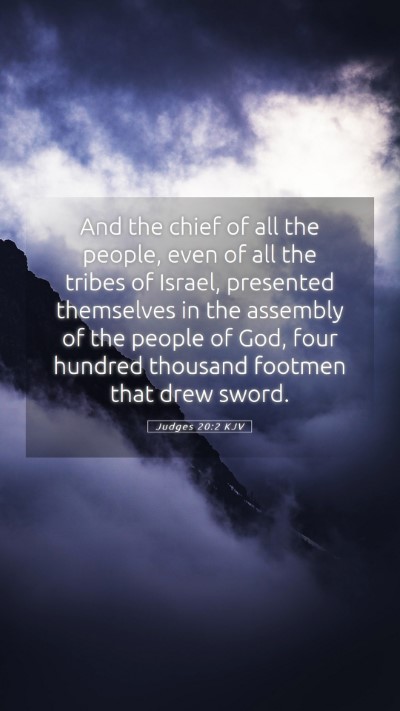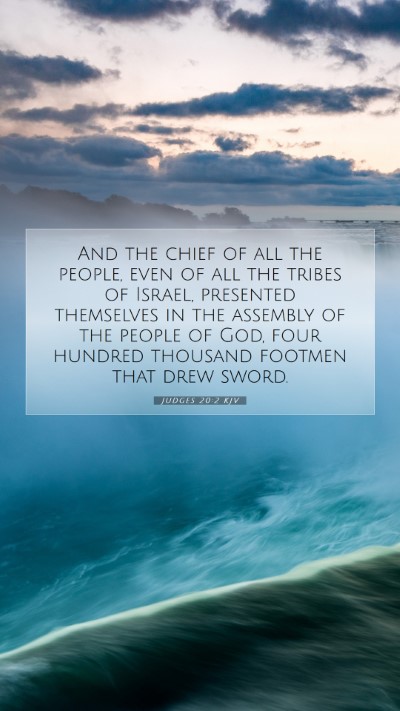Understanding Judges 20:2
Judges 20:2 states: "And the chief of all the people, even of all the tribes of Israel, presented themselves in the assembly of the people of God, four hundred thousand footmen that drew sword." This verse reflects a pivotal moment in Israel's history. It presents a detailed account of the gathering of the Israelites in response to a grievous event, which sets the stage for a significant and tragic conflict.
Bible Verse Meaning
The meaning of this Bible verse encompasses a deep reflection on unity and the moral responsibilities of the Israelite community. The gathering signifies a collective response to a moral outrage that had occurred within their society, demonstrating how serious offenses call the community to action.
Insights from Commentaries
Matthew Henry’s Commentary
Matthew Henry emphasizes that this verse illustrates the gravity of the situation and the urgency of response among the tribes of Israel. He notes that the leaders came together, indicating a united front against wrongdoing, as they sought justice and reconciliation for the heinous acts committed. The assembly showcases not only their commitment to justice but also their solidarity as a covenant community.
Albert Barnes’ Commentary
Albert Barnes highlights the numerical significance of "four hundred thousand footmen," symbolizing the readiness and the military might of Israel as they prepare to address the issues at hand. His analysis suggests that the sheer number indicates the seriousness of the situation, prompting an all-out response. He indicates that this gathering is not merely a show of force but a necessary step for accountability in the face of great evil.
Adam Clarke’s Commentary
Adam Clarke provides insight into the historical context surrounding this verse. He points out that this gathering took place in a time of moral decline in Israel where loyalty and community had begun to falter. The verse, therefore, serves as a reminder of the importance of community action and the role of leadership in addressing injustices in society. Clarke's commentary shows that the gathering was both a call to arms and a moral reckoning for the Israelite tribes.
Key Themes
- Unity in Crisis: The gathering illustrates how communities must come together during times of distress.
- Collective Responsibility: It emphasizes the notion that wrongdoings require a communal response, showcasing the social and moral duties of each member.
- Leadership and Accountability: The leaders' role in responding to the situation is crucial, highlighting the need for governance that protects the moral fabric of society.
Application of the Verse
The significance of Judges 20:2 can be applied to contemporary times as we navigate moral dilemmas within our own communities. It calls for believers to assess their responsibilities within their community and to react justly when confronted with wrongdoing. The verse serves as an instructional guide on how to interpret Bible verses, extending to discussions within Bible study groups and online Bible study forums.
Cross References
- Deuteronomy 13:12-18: Addressing the need for communal action against sin.
- 1 Peter 2:9: The believers as a chosen people called to declare the praises of God.
- Galatians 6:1: Encouraging believers to restore one another in a spirit of gentleness.
Conclusion
Judges 20:2 is rich in meaning and serves as a critical reminder of the role of community in addressing wrongs. Understanding Scripture requires us to consider both its spiritual implications and its moral exhortations. The insights provided by commentaries enhance our understanding of Bible verse meanings and interpretations, guiding our application of biblical principles in everyday life.


